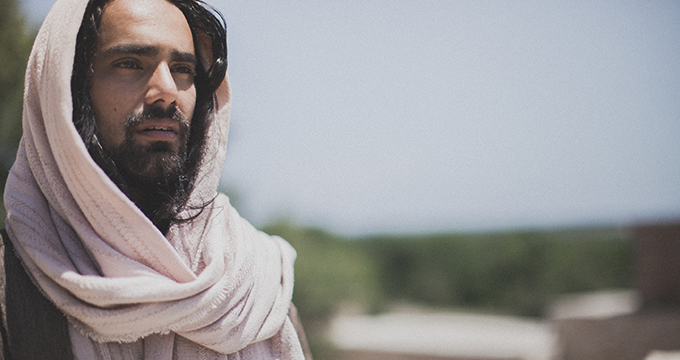Below you’ll find all of the answers to the questions for chapters 10-13 in our study on the book of Hebrews.

Looking ahead to our next Bible study, I see that I still have few little things I need to wrap up. I’ll be announcing details (including the topic) on that study in just a couple of weeks.
Subscribe so you don’t miss a post.
Chapter 10 – The Final Sacrifice

Verse 1 says that the law was only a shadow of good things that are coming. What does that mean?
This means that the law was an antitype of the new covenant. It was a reproduction or a glimpse into something much greater. That reality began to unfold when Christ came to earth.
Why was it necessary for the sacrifices to be made year after year?
Because the blood of those sacrifices were imperfect, it was impossible for them to take away sin. They served to remind man that we indeed are sinful and in need of redemption.
What is the holy sacrifice of the new covenant?
The body of Jesus Christ.
Why is it no longer necessary to have annual sacrifices made on our behalf?
By one sacrifice (the body of Christ) he has made perfect forever those who are being made holy.
What four things are we instructed to do in verses 23-25?
- To hold unswervingly to the hope we profess
- To consider how we may spur one another on toward love and good deeds
- To not give up meeting together
- To encouraging one another
What is the penalty for those who willfully reject God, trample the Son of God underfoot, and insult the Spirit of Grace?
A fearful expectation of judgment and of raging fire that will consume the enemies of God.
What are some of the hardships that the Hebrews experienced in the early church? See verses 32-34.
They were publicly exposed to insult and persecution, and stood side by side with those who were so treated. They suffered along with those in prison and joyfully accepted the confiscation of their property, because they knew that they had better and lasting possessions.
Chapter 11 – The Wall of Faith

What is faith?
Faith is confidence in what we hope for and assurance about what we do not see.
According to verse 6, what are two things every Christian must believe?
That He exists and that He rewards those who earnestly seek Him.
James 2:20 tells us that faith without works is dead. In what ways did Noah and Abraham’s work illustrate their faith?
Noah built and ark, which would have taken him years of persistence and patient faith. He held unswervingly to the hope he professed.
When Abraham was instructed to go to a foreign land, he went, not knowing where God would lead.
Everyone’s faith is tested in different ways. When Abraham’s faith was tested, he was willing to give up anything to follow God including his beloved son Isaac.
According to Verse 13, what two things do all of these people have in common? Can you give two examples?
They were still living in faith when they died, and they had not yet received those things that were promised.
Two examples are:
Moses led the Israelites through the desert for 40 years on their journey to the promised land. Moses died never having entered it himself, but God showed him the land from afar off:
Then Moses climbed Mount Nebo from the plains of Moab to the top of Pisgah, across from Jericho. There the Lord showed him the whole land—from Gilead to Dan, all of Naphtali, the territory of Ephraim and Manasseh, all the land of Judah as far as the Mediterranean Sea, the Negev and the whole region from the Valley of Jericho, the City of Palms, as far as Zoar. Then the Lord said to him, “This is the land I promised on oath to Abraham, Isaac and Jacob when I said, ‘I will give it to your descendants.’ I have let you see it with your eyes, but you will not cross over into it.” And Moses the servant of the Lord died there in Moab, as the Lord had said. – Deuteronomy 34:1-5
Abraham was promised that his descendants would be as numerous as the stars, but he died long before they multiplied as much as they have. Abraham was also promised, “That all of the people of the earth would be blessed through him.” This is a prophecy of the coming Messiah that would be born through his offspring. Jesus was born about 2000 years later.
The Lord had said to Abram, “Go from your country, your people and your father’s household to the land I will show you.
“I will make you into a great nation,
and I will bless you;
I will make your name great,
and you will be a blessing.
I will bless those who bless you,
and whoever curses you I will curse;
and all peoples on earth
will be blessed through you.” – Genesis 12:1-3
By faith, Jacob blessed each of Joseph’s sons. What were their names?
Ephraim and Manasseh
According to this chapter, how did Moses and his parents illustrate their faith?
They hid Moses’ until he was three months old. And, they were not afraid to disobey the king’s orders.
When and how did Moses keep the first Passover?
On the same night that the Hebrews left Egypt, Moses and his people kept the Passover. They applied blood to the sides and the tops of the door frames, so that the destroyer of the firstborn would not touch the firstborn of Israel. (Exodus 12)
Who were the women who received back their dead? See 1 Kings 17:17-24 and 2 Kings 4:8-37.
A widow in Zarephath, and the Shunammite woman.
According to verses 35-38 what are some of the ways believers were persecuted for their faith?
They were tortured, faced jeers and flogging, chains and imprisonment. They were stoned to death. Some were sawed in two, and some were killed by the sword. They wandered in deserts and mountains, wearing sheep and goat skins, they lived in caves and in holes in the ground.
Chapter 12 – Running the Race

Who is the great cloud of witnesses mentioned in Verse 1?
The faithful men and women who have gone on before us.
Verse 1 says to lay aside every “weight” and “sin” that easily besets us. What is the difference between the two?
Sin is a violation of God’s law either intentionally or out of ignorance. A weight is different in that it’s not always sin. A weight is more of a distraction that takes our eyes off of God, or slows us down from running the race set before us.
What lesson can we glean from verses 2-4?
To fix our eyes on Jesus, to endure opposition from sinners, and to always remember that our reward is in heaven. Once Jesus had finished running the race, He sat down with His Father in Heaven. We too, have that promise, or as the author put it, “the joy set before us” of eternal rest with out Father.
What else can we learn about patience through suffering from Romans 5:3-4?
That suffering produces perseverance; perseverance, character; and character, hope.
What does this chapter teach us about the chastening of God, and the trials we experience?
The Lord disciplines those He loves. When He disciplines us, He is treating us as His children. He disciplines us for our good, so that we might share in His holiness. The discipline of God produces a harvest of righteousness and peace for those who have been trained by it
What is another reason that God allows us to go through difficult times? See 2 Corinthians 1:3-7.
So that we can comfort others. When we share in suffering, we can also share in comfort.
Chapter 13 – Outside the Camp

What 8 things is the church reminded to do in verses 1-9?
- Love one another as brothers and sisters.
- Show hospitality to strangers.
- Remember those in prison.
- Honor marriage and keep the marriage bed pure.
- Keep your lives free from the love of money.
- Be content with what you have.
- Remember your spiritual leaders, and imitate their faith.
- Do not be carried away by all kinds of strange teachings.
Verse 12 says that Jesus suffered outside the city gate. What does that mean?
When Jesus was delivered into the hands of the Romans, we’re told that He was taken to a place called Golgotha to be crucified. Although we don’t know the exact location of Golgotha today, we know that it was close, yet outside the city of Jerusalem.
What’s interesting about this location is that it mirrors the sacrificial ceremony on the annual Day of Atonement under the Levitical Law. Once the High Priest had finished the ceremony within the Temple or Tabernacle, the remains, including the hides, the flesh, and the intestines of the both the bull and the goat whose blood was brought into the Holy of Holies, were taken outside the camp to be burned.
Charles Spurgeon writes, “Because it typified sin, it was so obnoxious to God that it might not be burned upon the great altar, but it was always burned outside the camp, to show God’s detestation of sin and His determination not only to put it away from Himself, but also to put it away from His Church. Now, when our Lord Jesus Christ came into this world to be our Sin-Offering, it behooved Him, also, to be put outside the camp–and it is very interesting to note how remarkably Providence provided for the fulfillment of the type. “
What does Verse 13 mean, when the author says to go with Christ outside the camp?
“Outside the camp” can best be understood when we consider scripture like that found in Numbers chapter 12. Because Miriam opposed Moses and disgraced God, she was sent outside the camp for 7 days. When Jesus was rejected by the Jews, He was sent outside the camp both literally and figuratively bearing His disgrace. Here the author was telling the church that they were stepping away from institutional Judaism and as a result would bear the disgrace. For us, going outside the camp with Christ is a step out of our comfort zone. It’s a step away from the traditions and comforts of this world to a place of sacrifice where we lay down our lives for the sake of the gospel.
What is a sacrifice of praise?
The fruit of our lips giving thanks to His name, or openly professing His name.
What is a sacrifice in the context of Verse 16?
Sometimes it’s easy to do good and to share with others. For example, when we share out of our abundance we don’t feel the sting. When we’re good to those who are good to us, we don’t feel the pain of humility. When we live a sacrificial life, we do God’s will even when it’s difficult to do so. We give when our money is tight, we love the unloveable, and we forgive those who hurt us.
Why is it important to submit to our spiritual leaders?
So that their work will be a joy and not a burden.
Considering a gift to Time-Warp Wife Ministries? Click here to donate.
About the Author

Darlene Schacht and her husband Michael live in Manitoba Canada where the summers are beautiful and the winters are cold. Together they’ve come to learn that relationships aren’t always easy, but that marriage, the way God intended it to be, is a treasure worth fighting for.
She began her publishing journey about twelve years ago when she pioneered one of the first online magazines for Christian women, known at the time as “Christian Women Online Magazine.” After three years, Darlene left CWO to blog as a solo author at Time-Warp Wife Ministries.
It was also during this transition that she worked alongside actress Candace Cameron Bure to write the NYT Best-Selling book, Reshaping it All: Motivation for Spiritual and Physical Fitness. Reshaping it All was the winner of both the 2011 USA Best Book Awards and the 2012 Christian Reading Retailers Choice Awards.
Author of more than 15 books, Darlene continues to write and to minister to her readers through her blog at TimeWarpWife.com.
Connect with Darlene:
Facebook: @timewarpwife
Instagram: @timewarpwife
Pinterest: @timewarpwife
Twitter: @timewarpwife
You are loved by an almighty God,
Darlene Schacht
The Time-Warp Wife

